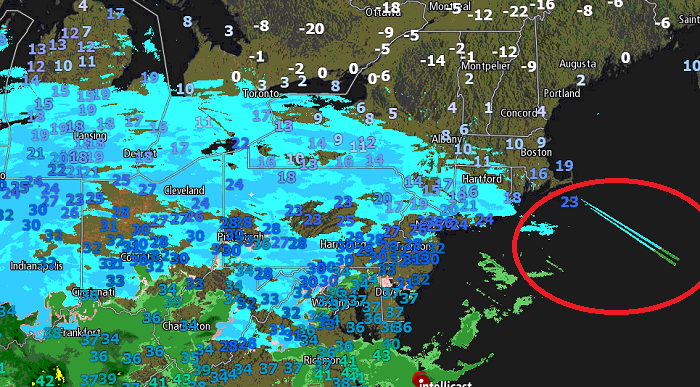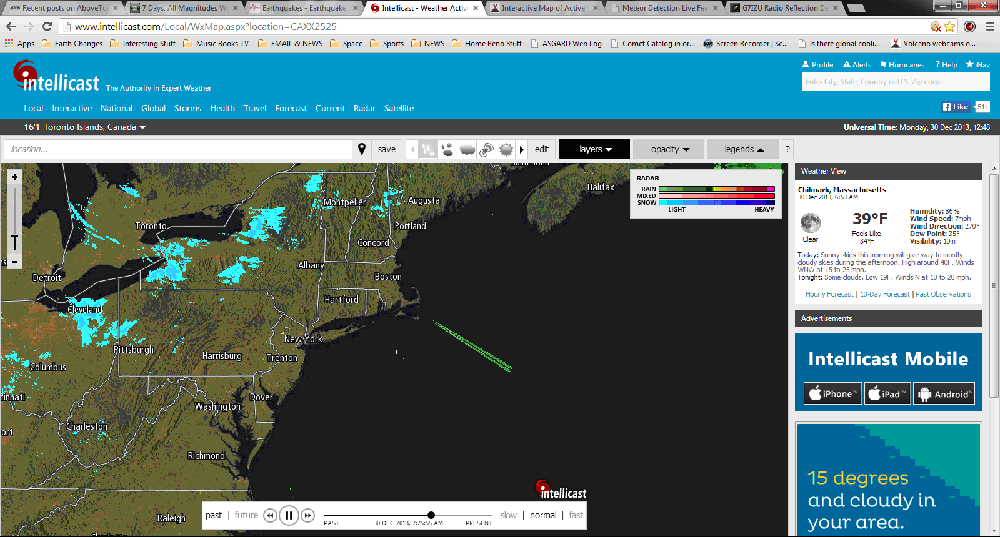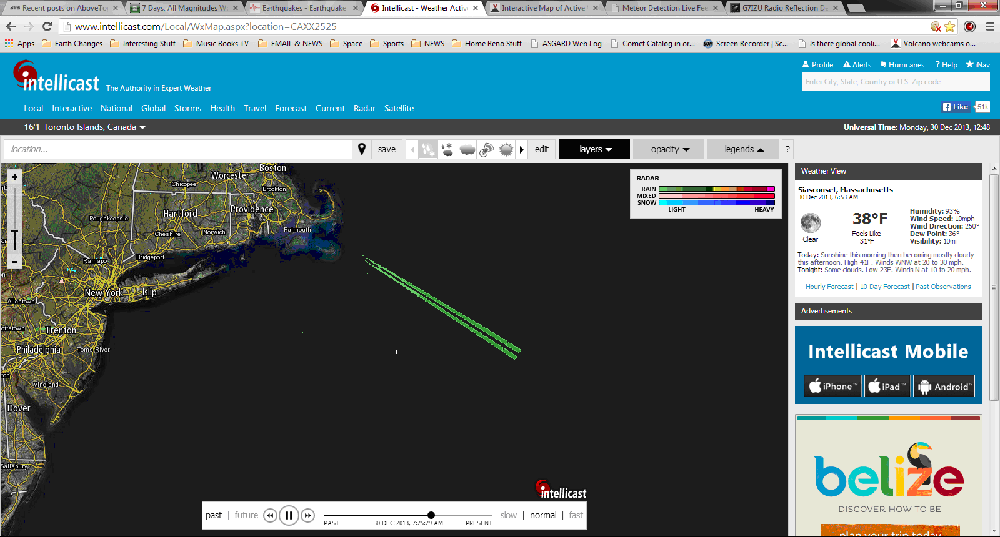It looks like you're using an Ad Blocker.
Please white-list or disable AboveTopSecret.com in your ad-blocking tool.
Thank you.
Some features of ATS will be disabled while you continue to use an ad-blocker.
Few Minutes Ago Mysterious "Booms" Being Felt in Toronto Again. Local Media Treats it Normally
page: 2share:
Nyiah
reply to post by Telos
My dad, stepmom and brothers live in suburban Detroit, not that far from Toronto. My dad has a thing for Windsor, and a park somewhere on the lake called Rondeau (I think that's how it's spelled) I do know the climate in the region. I was trying to mix in a climate joke that evidently fell flat. My bad, I guess I still think it's possible that some shallow freezing along faults, either known or unknown, could be plausible.
Toronto is over 250 miles away from Detroit. In terms of distance this is considered to be a far one. And when we talk about the weather pattern, even 20-30 miles make a big difference. (I keep on smiling due to your avatar. If it's your picture then you're very cute. lol...)
There may be a war or perhaps some heavy construction going on in the interior of the Earth. These are crazy times!
I read yesterday on aol news that the there were a lot of people in the midwest that heard a large boom sound.
I have seen a number of post speaking about this same thing on ats before, I myself believe it to be related to all these secret tunnels they are
building underground in america, only used by government officials.
TwiztidRoman
I read yesterday on aol news that the there were a lot of people in the midwest that heard a large boom sound.
That could be related thanks for the update care to share the link?
reply to post by Agent_USA_Supporter
First may I say, "Happy New Year, hope all goes well for everyone", . Why not wait until next week sometime, when things are up and running once more, then Phone a local Science / Geology Museum and ask if they can perhaps explain the cause - or likely - cause of such Sounds. Chances are they will put you through to someone more local who can explain just how such sounds are made (Hopefully).
First may I say, "Happy New Year, hope all goes well for everyone", . Why not wait until next week sometime, when things are up and running once more, then Phone a local Science / Geology Museum and ask if they can perhaps explain the cause - or likely - cause of such Sounds. Chances are they will put you through to someone more local who can explain just how such sounds are made (Hopefully).
Nyiah
I think I like my personal theory best. It's damn cold up there in the frozen north. Damn cold. Therefore, so is the ground. Water seeps in in warmer temps, freezes in voids & faults (you do have fault lines up there) The plates are constantly moving to some degree or another, right? Then by logical deduction, pressure is also always on the faults no matter where they are, wanting to be released.
The more direct version: I think the northern faults are having a tougher time moving & such with frozen water in their vicinity or directly on/in them, and the pressure stress is higher, and fracturing the frozen bonds while they move & shift around. Hence, BOOM.
What then would explain the consistent booms heard all over the place for the past few years when it's not cold out?
whatnext21
reply to post by Agent_USA_Supporter
Wonder if it had anything to do with this?
Time stamp Dec 30 7:25:55edit on 12/30/2013 by whatnext21 because: (no reason given)
Zoom of above image
edit on 12/30/2013 by whatnext21 because: (no reason given)
That looks like a good explanation. A sonic boom isn't just a one off event as an airborne vehicle takes off and lands, it's continuous as long as the air pressure is high enough (or altitude is low enough). So something like a hypersonic stealth drone could be taking off and landing from Boston. Then the sonic boom can be heard for hundreds of kilometers.
That was the problem with Concorde back in the 1970's. Everyone along the East and West coasts kept reporting mysterious booms.
luxurylaunches.com...
edit on 30-12-2013 by stormcell because: (no reason
given)
reply to post by steaming
Ah yes an local Science / Geology Museum they are a such help in these matters you know what they would there response would be? its only branches failing down to the ground sir.
Thats it. And thats the problem because they will never tell you what they were.
then Phone a local Science / Geology Museum and ask if they can perhaps explain the cause - or likely - cause of such Sounds. Chances are they will put you through to someone more local who can explain just how such sounds are made (Hopefully).
Ah yes an local Science / Geology Museum they are a such help in these matters you know what they would there response would be? its only branches failing down to the ground sir.
Thats it. And thats the problem because they will never tell you what they were.
reply to post by Agent_USA_Supporter
I’m very close to Belleville, Ontario and I definitely heard a bang this evening. Honestly, thought it might be fireworks, but it was just the one that I had heard. I was outside my dogs and it upset them so much we had to go in.
Also, I definitely heard one on Christmas eve. It was really loud. I’m on the 2nd floor of a two story house and it sounded like the bang came from downstairs. I thought maybe someone had fallen or slammed a door really loud. I felt my floor shake!
I actually ran down to check on everybody but they were safely asleep.
Strange! It’s definitely possible they might be normal ice quakes, but I don’t seem to recall ever hearing them before. And Canada is no stranger to the cold!
I’m very close to Belleville, Ontario and I definitely heard a bang this evening. Honestly, thought it might be fireworks, but it was just the one that I had heard. I was outside my dogs and it upset them so much we had to go in.
Also, I definitely heard one on Christmas eve. It was really loud. I’m on the 2nd floor of a two story house and it sounded like the bang came from downstairs. I thought maybe someone had fallen or slammed a door really loud. I felt my floor shake!
I actually ran down to check on everybody but they were safely asleep.
Strange! It’s definitely possible they might be normal ice quakes, but I don’t seem to recall ever hearing them before. And Canada is no stranger to the cold!
edit on 31-12-2013 by OwenandNoelle because: (no reason given)
reply to post by Agent_USA_Supporter
I couldn't find the exact one but this is the area i was talking about www.wdio.com...
I couldn't find the exact one but this is the area i was talking about www.wdio.com...
reply to post by stormcell
I was thinking something else, the trails are incoming usually around 7:30 am. If these were plane trails, would they not be showing up all day all over the world? How many planes are in the air every minute. I am thinking more along the lines of incoming meteors, just a thought. These thing are huge and flash for a second or so then disappear, so if someone else has a more plausible explanation, love to hear it.
Here is another from Dec 14, 2013

I was thinking something else, the trails are incoming usually around 7:30 am. If these were plane trails, would they not be showing up all day all over the world? How many planes are in the air every minute. I am thinking more along the lines of incoming meteors, just a thought. These thing are huge and flash for a second or so then disappear, so if someone else has a more plausible explanation, love to hear it.
Here is another from Dec 14, 2013

edit on 12/31/2013 by whatnext21 because: (no reason given)
I'm sorry if this explanation was already discussed...
A rare phenomenon, cryoseisms usually "occur when temperatures go from above to below freezing," says CBC News meteorologist Michelle Leslie.
"Water in the surrounding soil and rocks freezes. As water freezes, it expands, putting pressure on the dirt and rocks," she says.
"When the pressure build-up is too much, the dirt or rocks will crack, and you hear a loud boom."
They tend to occur between midnight and dawn, the coldest time of night and are very localized, so residents a few blocks away may not have heard the Christmas Eve or Christmas day booms.
www.cbc.ca...
Here in Vancouver, we just recently went from our usual humid +6 deg. down to well below freezing.
Lots of water in the cracks around here... it all froze.... no boom.
This kind of weather happens all the time in TO. warm and humid to absolutely freezing, It would suprise me if nobody noticed this booming before.
Lots of water in the cracks around here... it all froze.... no boom.
This kind of weather happens all the time in TO. warm and humid to absolutely freezing, It would suprise me if nobody noticed this booming before.
reply to post by MALBOSIA
Here's the strange part. Last year we had the same storm no blackouts no booms perfectly normal year 2012 was.
Here's the strange part. Last year we had the same storm no blackouts no booms perfectly normal year 2012 was.
Well it seems we may have an answer to what was causing the booming sounds some of had heard.
‘Frost quakes’ blamed for waking GTA residents with a boom
[ETA]
Seems I'm slow on the up take here SneakyB had already posted the reason above.
‘Frost quakes’ blamed for waking GTA residents with a boom
‘Frost quakes’ blamed for waking GTA residents with a boom
In the Greater Toronto Area, very cold weather may have triggered “frost quakes” early Friday morning that woke residents with a boom.
Many people in and around Greater Toronto reported explosions throughout the night, with some seconds or minutes apart. No damage or injuries were reported.
A “frost quake,” scientifically known as a cryoseism, is a rare weather phenomenon set off by a sudden drop in temperature, from above freezing to below 0C, causing water in the ground to freeze. Soil or rock saturated with water will expand, putting pressure on surrounding soil and rock until an explosion is caused.
“They are incredibly rare,” Environment Canada meteorologist Geoff Coulson said. This week was his first experience of them in 30 years, he said..
edit on 9/1/2014 by Sauron because: went to the source article
[ETA]
Seems I'm slow on the up take here SneakyB had already posted the reason above.
edit on 9/1/2014 by Sauron because: found the source
jimmyx
really?....no discussion or speculation if it could be sonic booms from freakishly high speed aircraft?? seems to me that if the sound was that loud and so widespread, cracking ice would leave a massive crevasse in the ground
That seems to be one of the more logical theories, but then this is happening all over the planet in recent years, including Russia, China, US, UK, pretty much everywhere.
If it was aircraft, they'd be infringing multiple airspaces so surely they'd have been seen or tracked by now i would have thought?
I'm starting to wonder if this might have anything to do with reports a few years ago of another galaxy or was it nebula(?) that was colliding or crashing into the Milky way...maybe we're seeing the start of effects from that?
The other thought is perhaps fracking is causing this somehow. Apart from those...?
reply to post by SneakyB
But that weather phenomena is reported as being rare..this is happening often and all over the place, warm and cold countrys are hearing it.
But that weather phenomena is reported as being rare..this is happening often and all over the place, warm and cold countrys are hearing it.
edit on 9-1-2014 by MysterX because: (no reason given)
Around 10 years ago, Hubby and I were out on a very cold clear blue sky day ice fishing. I was really excited because I had just caught a nice size
Bass. All of a sudden there was this Big Boom. Had my bladder been full I would have peed myself. LOL. I had bent down like I was bracing myself
to fall. At the same time I felt myself jumping up and starting to run towards the shore.
It all happen so fast. I don't know when I have been so scared. But at the same time I was reacting, I was looking around and noticed that no one else was reacting. What brought me back was hearing some guy yell " WOW that was a loud one"
Turned out to be something that Ice Fisherman are familiar with. They don't call it Ice quakes. They just say The ice is growing.
Well I have been Ice fishing now for many years now. Never have had that happen since. But if you talk to Ice fisherman, a lot of them have expeirieced this.
It all happen so fast. I don't know when I have been so scared. But at the same time I was reacting, I was looking around and noticed that no one else was reacting. What brought me back was hearing some guy yell " WOW that was a loud one"
Turned out to be something that Ice Fisherman are familiar with. They don't call it Ice quakes. They just say The ice is growing.
Well I have been Ice fishing now for many years now. Never have had that happen since. But if you talk to Ice fisherman, a lot of them have expeirieced this.
new topics
-
news article; "Only two Navy destroyers currently operational as fleet size hits record low"
Military Projects: 1 hours ago -
George Stephanopoulos and ABC agree to pay $15 million to settle Trump defamation suit
Mainstream News: 6 hours ago
top topics
-
The Mystery Drones and Government Lies
Political Conspiracies: 16 hours ago, 14 flags -
George Stephanopoulos and ABC agree to pay $15 million to settle Trump defamation suit
Mainstream News: 6 hours ago, 14 flags -
Light from Space Might Be Travelling Instantaneously
Space Exploration: 14 hours ago, 9 flags -
The MSM has the United Healthcare assassin all wrong.
General Conspiracies: 14 hours ago, 8 flags -
2025 Bingo Card
The Gray Area: 14 hours ago, 7 flags -
More Bad News for Labour and Rachel Reeves Stole Christmas from Working Families
Regional Politics: 12 hours ago, 7 flags -
news article; "Only two Navy destroyers currently operational as fleet size hits record low"
Military Projects: 1 hours ago, 3 flags
active topics
-
Drones everywhere in New Jersey
Aliens and UFOs • 165 • : Zaphod58 -
Mass UAP events. DC. Machester Airport, UFOs over sub base in CT, Nuke bases.
Aliens and UFOs • 57 • : WeMustCare -
FBI Director CHRISTOPHER WRAY Will Resign Before President Trump Takes Office on 1.20.2025.
US Political Madness • 26 • : WeMustCare -
George Stephanopoulos and ABC agree to pay $15 million to settle Trump defamation suit
Mainstream News • 10 • : WeMustCare -
President-Elect DONALD TRUMP's 2nd-Term Administration Takes Shape.
Political Ideology • 330 • : WeMustCare -
Light from Space Might Be Travelling Instantaneously
Space Exploration • 24 • : norhoc4 -
Will all hell break out? Jersey drones - blue beam
Aliens and UFOs • 68 • : Skinnerbot -
Pelosi injured in Luxembourg
Other Current Events • 36 • : nugget1 -
news article; "Only two Navy destroyers currently operational as fleet size hits record low"
Military Projects • 0 • : Coelacanth55 -
The MSM has the United Healthcare assassin all wrong.
General Conspiracies • 12 • : StoutBroux


